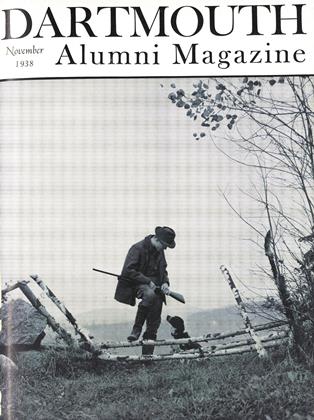VERSATILE IN TALENTS HIS CAREER WAS COMPREHENSIVE AND DISTINCTIVE
HOMER EATON KEYES, of the class of 1900, died on the afternoon of Saturday, October 8, in New York City. He was born in Brooklyn on December 21, 1875. He prepared for college at the Boys' High School in his native city, but also found time to study art for a year at the Pratt Institute. After a remarkable undergraduate career at Dartmouth, he was upon graduation appointed instructor in English. From 1903 to 1905 he studied abroad and in 1906 was made assistant professor of Modern Art. In 1913 he was appointed business director of Dartmouth and continued to act in that capacity until 1921. After severing his official connection with the College he became editor of the magazine Antiques, first in Boston and subsequently in New York. He was a member of the Psi Upsilon and Phi Beta Kappa fraternities and of the Casque and Gauntlet senior society. He was married on April 2, 1903, to Caroline Gardner Abbott, who died in May of this year. He is survived by a daughter, Katharine.
My friendship with Homer began in the autumn of 1900 when we were both cub instructors living in the Howe Library. It continued without the slightest interruption until his death. I was too late an arrival on the Hanover scene to know much about his undergraduate record and so must gather my information from others. My friend and Homer's classmate. Professor L. B. Richardson, has furnished me with the following note: "Homer did a good many 'first' things. He was a member of the first Palaeopitus. He was one of the organizers of the first large dance, or Junior Prom, held by the College. He was the only man in my recollection to hold the offices of editor-in-chief of the Aegis, the Dartmouth Literary Monthly, and TheDartmouth, holding the last two in his senior year. As an undergraduate he maintained a scholastic average which, I think, placed him fourth in the class, and carried on such outside activities as were involved in the leadership of the Mandolin Club, taking a prominent part in dramatics, and other activities too numerous to mention."
Perhaps I can best give my impressions of Homer by stating them somewhat in the order in which they were revealed to me. His most obvious quality in those early days was an astonishing versatility. His range was enormous; he was "clever" at everything he undertook. Looking a little more deeply, one may say that he was a very rare combination of verbalist and craftsman, of talker and doer. He had a fine command of language and easily shone in conversation and discussion, but at the same time he was always doing something, whether it was designing posters, teaching a class, supervising student activities, or (in later days) administering the business affairs of the College and helping plan the Baker Library. He might readily have paid the price of his versatility had he not learned in good season to restrict himself and go in for specialized work. As it was, he became first a trained scholar in the field of modern art and later an expert authority on antique furniture.
Homer's mind was essentially constructive. He had imagination to envisage the future and prepare for it. I know of no undertaking of his that ever failed. The uniform and conspicuous success which crowned his efforts was sufficient warrant for the self-confidence which was a component part of his make-up and a potent influence in commanding the respect of others.
In recent years he became increasingly conservative and grew more and more to dislike reformers, uplifters, and innovators. He was genuinely convinced that the world had fallen on evil days; he was even inclined to believe that we were already in the dark ages without knowing it. Holding his convictions very firmly, he would sometimes dogmatize in a manner that might have appeared truculent, if his seemingly harsh judgments on men and things had not been uttered in a tone of bluff joviality which was at once disarming and amusing.
To attempt to convey the flavor of a personality by using descriptive terms is necessarily futile. When I say that Homer was enterprising, colorful, picturesque, abounding in humor, immensely and intensely alive, always interested and always interesting, I speak but the sober truth. But the unique way in which these characteristics were fused and integrated in the man was the secret of Nature's workshop, made manifest to those of us who knew him well. On the purely human side, he was a boon companion, loyal to his friends, and capable of strong personal attachments. His home at 37 Rope Ferry Road was, during the years of his long Hanover residence, the centre of a delightful and stimulating hospitality which can never be forgotten by those who shared it.
Dartmouth has lost by his death one of her most devoted sons and well-doers. His memory will continue green as long as his many friends and acquaintances remain alive. Let us hope that it will be handed down to posterity by the record of our appreciation.
 View Full Issue
View Full Issue
More From This Issue
-
 Class Notes
Class Notes1930*
November 1938 By ALBERT I. DICKERSON -
 Sports
SportsBig Green Teams
November 1938 By "Whitey" Fuller '37 -
 Article
ArticleGradus Ad Parnassum
November 1938 By The Editor -
 Article
ArticleDartmouth's Rebel Saint
November 1938 By ALLAN MACDONALD -
 Class Notes
Class Notes1917
November 1938 By EUGENE D. TOWLER -
 Class Notes
Class Notes1921*
November 1938 By CHARLES A. STICKNEY JR.








